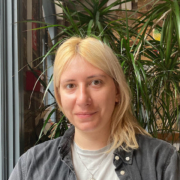I am a PhD student in the History Department at the European University Institute (EUI) in Florence, Italy. Before joining EUI, I studied art history at Warsaw University and sociology and social anthropology at Central European University, where I focused on the social contexts of modern art production. In my research, I blend methods from historical research and the social sciences. Currently, I am working on my thesis, which examines the transformation of the Polish bra industry in the 20th and 21st centuries. I analyze how the introduction of neoliberalism has affected production modes, property regimes, and gendered class relations. My research also addresses memory conflicts around the 1989 privatization and how these unresolved tensions continue to shape local politics and inform everyday discourses. I situate my findings within global value chain theories to interrogate the role of post-socialist Eastern European states in the contemporary world order. In addition to working on my thesis, I am passionate about intersectional economic research that addresses social inequalities, as well as feminist and queer theory. I am a member of the Queer and Feminist Working Group at EUI, and I have taught courses on contemporary social theory and an introduction to queer theory.
Project statement: “Flexible labor, intimate objects. Undergarment production in socialist and postsocialist small-town Poland, 1949-2023”
My project explores the changes of the lingerie industry in Głowno, known as the “bra capital of Poland,”, over the past 70 years from the 1950s until the 2020s, focusing on the impact of the 1989 fall of the socialist state and the introduction of neoliberal democracy in Eastern Europe. It examines the transition of production modes from independent cooperative to state socialist shopfloor, and eventually to private entrepreneurship, reflecting broader shifts in global value chains. This thesis contributes to scholarship on how the interplay between global capitalism and local experiences generates inequalities based on class, nationality, race, gender, and sexuality, offering insights into labor and capital dynamics in post-socialist Europe. From the 1970s to the 2010s, the Polish bra industry operated as a semi-peripheral subcontractor, providing cheap labor for multinational Western corporations. As part of the global race to the bottom of the garment sector, production eventually shifted to Asia. Since 1989, the industry has reorganized from the public to the private sector, altering local production and consumption patterns. This transition also sparked conflict over the privatization of industry resources and profits, alongside the imposition of new labor regimes that continue to inform local power relations. Through a case study of Głowno, the research draws on oral history interviews with workers, managers, and business owners in the corsetry industry, analyzing how they narrate these changes in the context of the neoliberal turn and globalization. By situating this local industry within broader global patterns, the project examines how economic transitions reshape property relations, class and gender structures, and drive conflicts over justice and equity in this small town.





